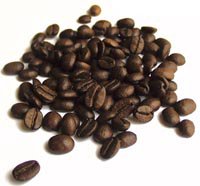 While I'm talking about coffee, it's only fair to mention some other aspects.
While I'm talking about coffee, it's only fair to mention some other aspects.Below are three more studies. Two suggest that the caffeine in coffee can increase blood glucose (BG) and make cells more resistant to insulin after a meal. The third finds benefits in coffee's non-caffeine phenolic compounds.
There are differences that set these studies apart from the ones just posted which discussed coffee's possible role in reducing the risk for diabetes.
- Their study populations were small, 14 and 9, compared to several thousands in the previous studies.
- The first two studies tested the effect of just one chemical in coffee, caffeine, rather than the complete beverage.
There are a number of biologically active molecules in coffee. Some, unlike caffeine, may improve measures of glucose tolerance. An example of this is documented in the third study below. It found that, although the caffeine in coffee increased post-meal blood glucose, another component, chlorogenic acid, slowed the rate of absorption of glucose, resulting in a lower post-meal BG than if it had not been consumed.
1. Diabetes Care, August 2004
Caffeine Impairs Glucose Metabolism in Type 2 Diabetes
The study group consisted of 14 people, average age 61, with type 2 diabetes. The intervention group received 375 mg of pure caffeine. After a meal, blood glucose levels were 21% higher among caffeine-takers when compared to a non-caffeine control group; blood insulin was 48% higher.
2. American Journal of Clinical Nutrition, July 2004
Caffeine Ingestion Increases the Insulin Response to an Oral-glucose-tolerance Test in Obese Men Before and After Weight Loss
The study group consisted of 9 obese, non-diabetic men, age 23-34.
Caffeine ingestion (5 mg/kg body weight, about 475 mg caffeine for a 210 lb man) was found to decrease a measure of insulin sensitivity by 15%.
3. American Journal of Clinical Nutrition, October 2003
Coffee Acutely Modifies Gastrointestinal Hormone Secretion and Glucose Tolerance in Humans: Glycemic Effects of Chlorogenic Acid and Caffeine
The study group consisted of 9 non-diabetic men and woman, average age 26. Participants were given instant caffeinated coffee, instant decaffeinated coffee, or glucose water. Components in coffee, possibly chlorogenic acid, were found to decrease the rate of intestinal absorption of glucose.